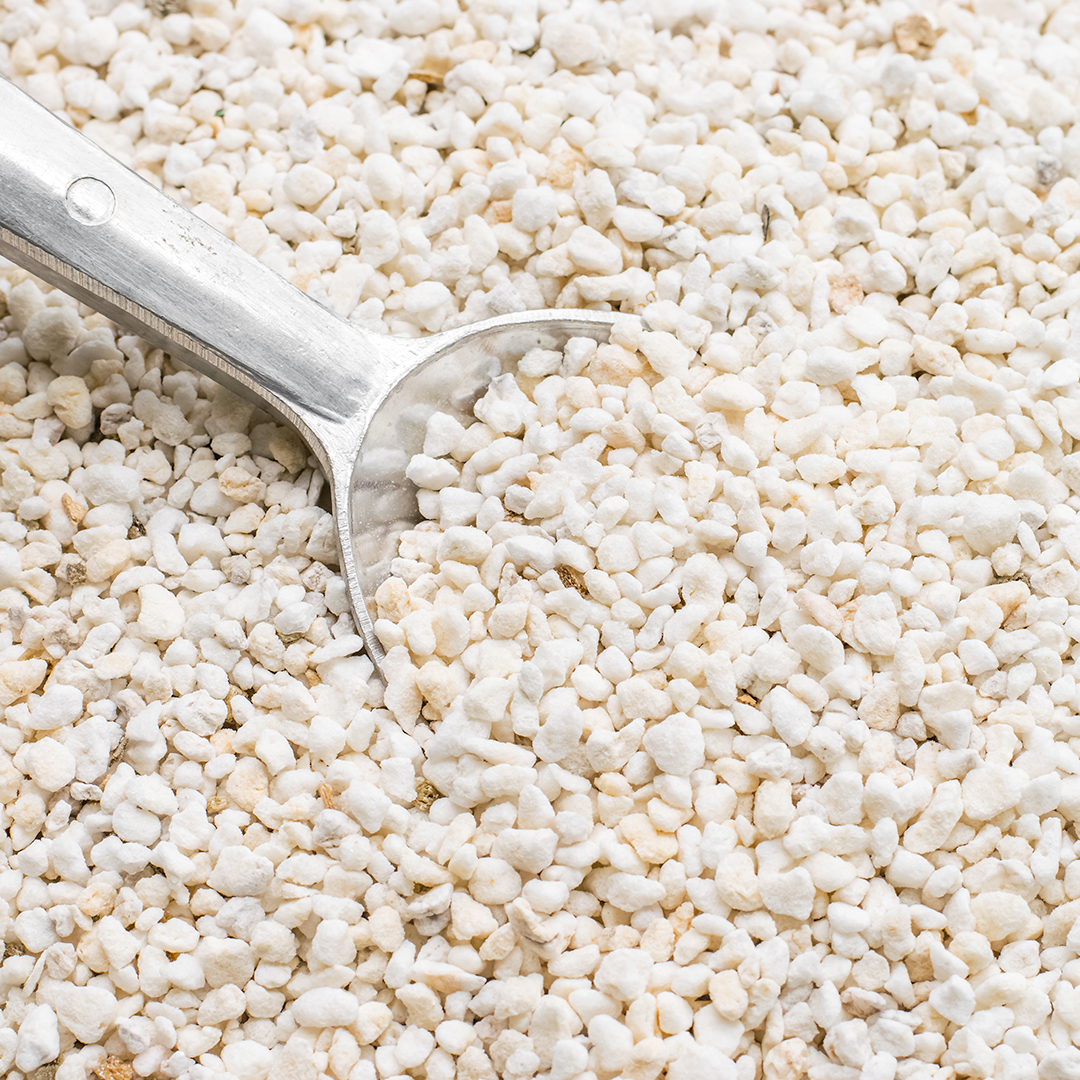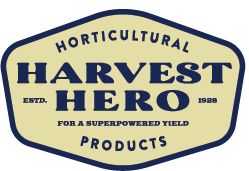Why Perlite Is the Top Choice Soil Amendment

As many growers know, nearly endless decisions need to be made during the entire growing process. What are you going to grow? Are you going to start from seed or seedling? Will you grow indoors or out? Are you growing organically or with the help of chemical fertilizers? Will you grow with soil or soilless media? And then, which soil amendment is best for your plant and growing method? It can feel overwhelming when there are hundreds of ways to mix and match your methods. While you still have some tough decisions to make, we can help you choose the best soil amendment to grow abundantly.
Why Use Soil Amendments?
Soil amendments improve a soil’s physical condition that effects plant growth. Amendments work by allowing water and nutrients to move more easily through the soil to reach the roots to help the plant flourish. Adding a soil amendment will create a better environment for roots that will improve the soil structure and water holding capacity, the availability of nutrients, and the living conditions for soil organisms, which are important for the plants to grow.
Soil Amendment Options
Coco Coir
Compared to other soil media mixes, using coconut coir is considered a newer method. Coir is everything in between the shell and the outer coating of the coconut seed, which at one point was considered waste. Coir is most popular with hydroponic growers.
Pros
- Has good water retention.
- Deters fungus, gnats, and certain diseases.
- Supports roots.
- Coir used in indoor hydroponic systems can be recycled to outdoor vegetable gardens or compost piles.
Cons
- Its pH is close to (but not exactly) neutral. It is about 6 to 6.7.
- It is grown in ocean climates and can be high in salts. Some growers recommend washing coco coir before use, adding a step to your growing process.
- The high potassium content can interfere with calcium absorption. Adding calcium amendments to soil mix can take care of this problem, but it’s an additional step and cost.
- There is a higher chance of overwatering plants than soil media mixes using perlite or rockwool.
Rockwool
Rockwool is made from Basalt rock and chalk that are melted to a lava-like state and blown into a large spinning chamber, which pulls the melted rock into fibers like cotton candy. These are the same fibers flying around in the air surrounding a volcano. Once the fibers are spun, they are compressed into a mat which is then cut into slabs and cubes. It is a major vegetable and flower production medium, most commonly used in hydroponic growing.
Pros
- Basalt rock and chalk are natural ingredients.
- Chemically and biologically inert.
- Zero cation exchange capacity.
Cons
- Can have a high pH when first acquired and may need an acidic rinse before use.
- It is more prone to overwatering than media like perlite.
Wood Fiber
Wood fibers are made from passing wood material through screw presses, and the resulting product looks like cotton wool. Wood waste or virgin wood can be used, but in both cases, there is little to no bark. Research has shown that loblolly pine is the best tree species in the United States for making wood substrates, though there are many options to choose from.
Pros
- Wood fiber increases wettability and water capture better than peat alone.
- It can help wick water from sub-irrigated systems and move water throughout the container.
- Wood fiber and peat moss create a unique matrix when they nest together and form a sponge-like substrate. This prevents splashing and channeling of water.
Cons
- It encourages accelerated root growth in most crops. While it sounds appealing, it isn’t always a good thing for all crops because it changes irrigation needs.
- Wood fibers have inherently high pH levels than other soil media, so the pH level will need to be tested and frequently adjusted.
- Wood fibers dry out quicker on the surface of the soil than other soil media mixes, so overwatering can be an issue if soil moisture is not tested at a deeper level.
Perlite
Perlite is one of nature’s most versatile and efficient minerals. It is formed by molten (magmatic) rock, also known as volcanic glass. Over time and during formation and cooling, water is absorbed into the raw perlite ore matrix. And when it is heated rapidly in industrial furnaces, the volcanic glass softens, causing the entrapped water molecules to turn to steam and expand the perlite particles—much like popcorn. This can increase in volume up to 20 times its original size.
Perlite is used across a variety of industries and is a top choice for professional growers.
5 Top Reasons Why Perlite Is the Best Soil Amendment for Your Garden
Horticultural perlite is a lightweight, non-organic, soil conditioner that provides a number of important benefits to commercial growers, landscapers, and home gardeners, including:
1. No expiration date: Because perlite is inorganic, it remains stable and doesn’t compose or break down. It won’t mold or attract pests, making it virtually timeless.
2. Lightweight: Because of its light weight, perlite is easier to handle and store than other soil mix media.
3. Water retention: Perlite softens when heated rapidly in industrial furnaces, causing entrapped water molecules to turn to steam and expand the perlite particles up to 20 times its original size. The extra space absorbs water, helping keep roots moist while preventing over-watering.
4. Prevents the need for other additives and chemicals: Horticultural perlite is free of organic contaminants, making it naturally pest- and disease-proof, negating the need for chemicals required to prevent and treat pests and diseases. Plus, it has an ideal pH range of 6.5 to 7.5, so you will not have to use other products to balance the pH.
5. Improved aeration: It breaks up compacted areas for better water drainage and also has a high displacement and volume capacity.
Take Out the Guesswork with Harvest Hero’s Perlite Products
Harvest Hero Enhanced Perlite Mix
Harvest Hero Enhanced Perlite Mix is a nutrient-rich soilless amendment and growing medium that is a 3-in-1 blend comprised of perlite, diatomaceous earth, and essential nutrients. Enhanced Perlite Mix helps your plants get the nutrition they need to improve soil conditions, especially during critical vegetative growth weeks. It will increase the plant’s structural integrity, increase stem diameter, and help you achieve increased yields.
Perlite+ Silica
Harvest Hero is debuting an exciting new product for growers: Perlite+ Silica! Similar to our Enhanced Perlite Mix, this blend spotlights perlite and diatomaceous earth (the silica content) to support all stages of plant growth. Without the addition of nutrients, you have more control over the ones you add to your soil mix. The benefits of this blend include:
- Natural soil substrate: an organic amendment that will increase growth.
- Maintains high levels of oxygen in the soil.
- Increases your crops’ uptake in water and essential nutrients.
- The silica source provided by diatomaceous earth enhances resiliency towards abiotic environmental stress factors.
- Minimizes pH fluctuations by keeping oxygen levels consistent.
- Increases plant mass and plant growth. The silica fortifies the plant tissue to improve plant conditions in times of abiotic stress, like during temperature extremes, sunlight, and water extremes.
Shop now for FREE SHIPPING on orders of $40 or more. Try it today and grow further with Harvest Hero!



